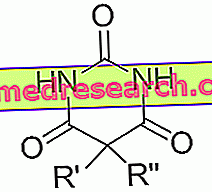Generality
Barbiturates are a class of drugs that can depress the central nervous system. They have anxiolytic, hypnotic, anticonvulsant, sedative and anesthetic properties.

General structure of Barbiturates
Barbiturates also have analgesic properties and were once used in association with non-steroidal anti-inflammatory drugs (NSAIDs) for the treatment of headaches and tension headaches.
These drugs derive from barbituric acid and - from the chemical point of view - they are diacylureas.
Generally, the effects of barbiturates are dose-dependent, ie they depend on the amount of drug administered.
Depending on the type, dose and route of administration chosen, barbiturates may have hypnotic, anticonvulsant or anesthetic sedative activity.
However, today barbiturates are considered obsolete drugs and are no longer used - except in specific cases - due to their narrow therapeutic index and their toxicity. Their use has been replaced by the use of safer drugs, such as - for example - benzodiazepines.
Indications
For what it uses
As stated above, the use of barbiturates has been reduced considerably in favor of drugs with greater safety and a higher therapeutic index.
Before the advent of benzodiazepines, barbiturates were widely used as hypnotic and anxiolytic sedative drugs in the treatment of anxiety and insomnia.
Now, instead, barbiturates are used above all as anticonvulsants in patients suffering from epilepsy (this is the case of phenobarbital), or they are used in the field of anesthesia.
Action mechanism
Barbiturates exert a depressing effect on the central nervous system. In particular, they depress neuronal activity, the activity of smooth muscles, the activity of skeletal muscles and that of the myocardium.
Barbiturates work by increasing the signal of γ-aminobutyric acid (or GABA).
GABA is the main inhibitory neurotransmitter of the brain and performs its functions by binding to its receptors: GABA-A, GABA-B and GABA-C.
More precisely, the barbiturates bind to a particular binding site present on the GABA-A receptor, the site for picrotoxin.
Picrotoxin is a phytotoxin extracted from the climbing plant Anamirta cocculus.
This toxin has convulsive properties and exerts an exciting action on the center of the breath and on the vasomotor center of the brain. In fact, picrotoxin - in some cases - can be used in acute barbiturate poisoning.

Classification of barbiturates
Barbiturates can be classified according to their duration of action. Therefore, they can be divided as follows:
- Barbiturates with an ultra-short duration (about 20 minutes), the tiopental belongs to this category;
- Barbiturates with short duration of action (3-4 hours), pentobarbital and secobarbital belong to this category;
- Barbiturates with an intermediate action (4-6 hours), the amobarbital and butabarbital belong to this category;
- Long-acting barbiturates (6-12 hours) include primidone and phenobarbital in this category.
Side effects
Barbiturates can induce various types of side effects, including:
- Excessive sedation;
- Ataxia;
- nystagmus;
- Confusion, especially in elderly patients;
- Respiratory depression;
- Reduction of cardiac contractility;
- Disorders of consciousness up to the coma.
Furthermore - when administered at very low doses - barbiturates can have paradoxical effects, such as hyper-excitation and agitation.
Barbiturates can also alter the transport of sugars and are powerful inducers of liver enzymes, which makes them the cause of possible drug interactions with other medicines or substances.
In particular, the concomitant intake of barbiturates and of:
- Alcohol;
- Preparations based on St. John's wort (or St. John's wort, a plant that has antidepressant properties);
- Other psychiatric drugs;
- Antihistamine drugs.
Finally, barbiturates induce tolerance, physical dependence and psychic dependence.
If treatment with barbiturates is stopped abruptly, withdrawal symptoms may occur, the main symptoms of which are:
- Tremors;
- Sweating;
- Anxiety;
- agitation;
- Tachycardia;
- Hypertension;
- Convulsions;
- Delusions.
The treatment of this syndrome is supportive and the patient's vital functions, such as heart rate, blood pressure and body temperature must be controlled.
Barbiturate poisoning
Barbiturate poisoning - both voluntary and accidental - constitutes a serious danger to the patient's life and many cases of poisoning have had fatal results.
Barbiturates, in fact, have a narrow therapeutic index, which means that the difference between the usually used therapeutic dose and the lethal dose is minimal. Because of this fact, barbiturate overdoses have been very frequent, especially during their use as hypnotic sedatives, but voluntary intoxications in suicide attempts have also been numerous.
The symptoms that can occur following a barbiturate overdose are:
- Drowsiness;
- Alteration of the level of consciousness;
- Breathing difficulties;
- hyporeflexia;
- Changes in motor coordination;
- Gait and balance disorders;
- Speech disorders.
In the most serious barbiturate poisonings can also arise:
- Hypothermia;
- Muscular hypotonia;
- Circulatory failure;
- Respiratory depression;
- Coma;
- Death.
Furthermore, after overdose, bronchopneumonia may occur which is often the cause of late death. Therefore, in case of an overdose of barbiturates, antibiotic drugs can be administered, in order to prevent pulmonary complications.
In reality, there is no real antidote against barbiturate poisoning.
If an overdose of a barbiturate is taken, gastric lavage is usually performed immediately, as long as the patient's condition allows it.
The elimination of the already absorbed drug can be carried out through forced diuresis and - in some cases - the alkalinization of the urine can also be useful.
In more serious cases, hemodialysis can be used.
Contraindications
Generally, the use of barbiturates is contraindicated in the following cases:
- In patients with hepatic and / or renal insufficiency;
- In patients suffering from severe liver disease;
- In patients with porphyria;
- In patients with acute alcohol intoxication, analgesic drugs or hypnotic drugs;
- During breastfeeding.



